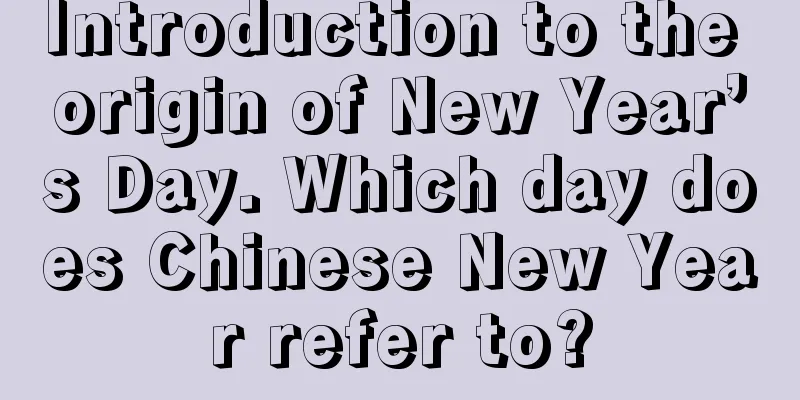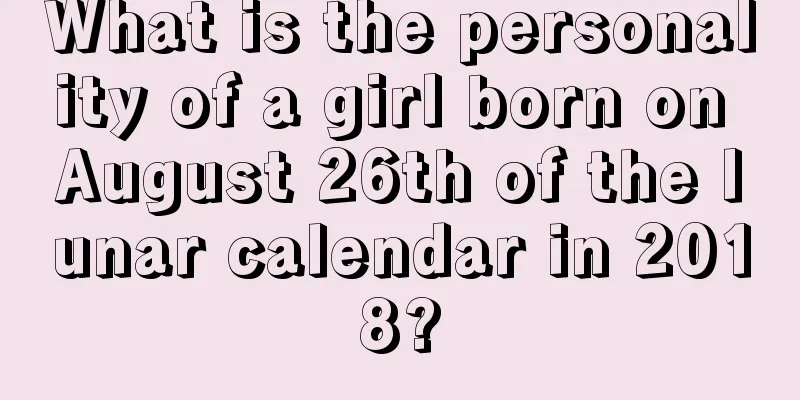Introduction to the origin of New Year’s Day. Which day does Chinese New Year refer to?

Every festival has its own origin, so let’s take a look at the origin of New Year’s Day. Mr. Shuimo has carefully compiled detailed information about the twelfth month of the lunar calendar in 2019. If you want to know the auspicious and inauspicious days of the twelfth month of the lunar calendar, just go to Mr. Shuimo.Introduction to the Origin of New Year's DayIn 1911, the Xinhai Revolution led by Sun Yat-sen overthrew the rule of the Qing Dynasty and established the Republic of China. In order to "follow the Xia calendar to follow the agricultural season and the Western calendar to facilitate statistics", the Gregorian calendar was decided to be used in the first year of the Republic of China (actually used in 1912), and January 1 of the Gregorian calendar was designated as "New Year", but it was not called "New Year's Day". Representatives of provincial governors met in Nanjing and decided to use the Gregorian calendar, calling the first day of the first lunar month "Spring Festival" and January 1 of the Gregorian calendar "New Year's Day", but it was not officially announced at the time.On January 1, 1912, the Republic of China was established and Sun Yat-sen took office as the provisional president in Nanjing. In his oath of office, Sun Yat-sen ended with "New Year's Day of the first year of the Republic of China." This is the origin of China's "New Year's Day" What day is Chinese New Year's Day?New Year's Day is on January 1st of the lunar calendar every year.It's not just China that has New Year's Day on January 1st of the lunar calendar. New Year's Day in other countries also falls on this day. The word "New Year's Day" first appeared in the "Ya Yue Ge" by the Liang people in the Southern Dynasties: "The four seasons are new on New Year's Day, and the longevity begins today." Yuan means first or beginning and Dan means morning. Yuan and Dan together refer to the beginning of the year, which is the day when the year begins. However, the choice of which day to take as the beginning of the year has been different in different dynasties in my country. "Records of the Grand Historian" records: In the Xia Dynasty, the first day of the first lunar month was New Year's Day; in the Shang Dynasty, the first day of the twelfth lunar month was New Year's Day; in the Zhou Dynasty, the first day of the eleventh lunar month was New Year's Day; in the Qin Dynasty, the first day of the tenth lunar month was New Year's Day; and Emperor Wu of the Han Dynasty restored the first day of the first lunar month as New Year's Day. It has continued since then. After the Xinhai Revolution, the Gregorian calendar was adopted. The first day of the first lunar month was called the Spring Festival, and the first day of the first month in the Gregorian calendar was called the New Year. Everyone's destiny is different. Click on the following calculation to see what your destiny will be. |
<<: What is the date and day of the New Year's Day in 2020? One day off for New Year's Day in 2020?
Recommend
Is it inappropriate to get a marriage certificate one day after Jingzhe in 2020? What are the climatic characteristics of the Jingzhe solar term?
Introduction: According to tradition, it is necess...
Query of auspicious time and inauspicious time for November 27, 2018
Want to know more about the auspicious and inausp...
Is it okay to burn incense and worship Buddha on Labor Day on May 1, 2020? Famous quotes on Labor Day!
Introduction: You need to choose an auspicious day...
When is Valentine's Day in 2020? What is the origin?
Festivals about love are always given importance, ...
Are people born on the fourth day of the eighth lunar month in 2020 a Virgo? What are the advantages?
Whether a child is a Virgo is also a concern of ma...
Is it a good idea to move house on the 14th day of the eighth lunar month in 2017? Can I move into my new home?
The golden autumn is in August. We harvest beauti...
Is Chinese Valentine’s Day a traditional festival? Is there a holiday for Chinese Valentine's Day?
The seventh day of the seventh month of the lunar ...
What is the origin of New Year's Day? What are the legends about it?
Many things have their origins, just like everyone...
Is it good to get pregnant during the Lesser Heat solar term? When will the baby be born if conceived during the Lesser Heat in 2022?
People say that pregnancy lasts ten months and chi...
Is it possible to travel on May 16th, the Lunar Year of the Tiger 2022? Is it an auspicious day?
Is it possible to travel on May 16th, the Lunar Ye...
What day is March 11th in the lunar calendar 2017? Can we get married?
Introduction: In March, the sun is shining, the br...
Is the first day of the second lunar month in 2019 a suitable day for repairing graves? What should we pay attention to when repairing graves?
Introduction: Repairing a grave is a very importan...
What should we do in the beginning of summer in 2019? What are the three fresh delicacies in the beginning of summer?
Tour guide: The Beginning of Summer is also an imp...
What are the customs on New Year’s Day? What festival is on the first day of the Lunar New Year?
Introduction: China has been a traditional country...
What are the do’s and don’ts on the fourth day of the third lunar month in 2018?
The third month of the lunar calendar is the last...









